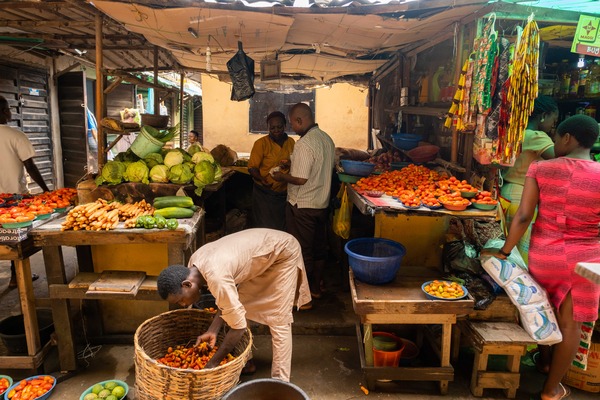An X-ray of the struggles associated with attaining economic success in Nigeria and varying ways to contend with the attendant challenges.
26th July 2023 12:37 PM ![]()

Nigeria has long struggled with economic development and corruption, with many of the country's citizens living in poverty despite vast natural resources. Corruption has been a major factor hindering economic growth, many government officials are allegedly embezzling funds and engaging in other corrupt practices. Despite efforts to combat corruption, it remains a major problem in Nigeria, with many citizens feeling disillusioned and frustrated with the lack of progress. However, there are also citizens who are dedicated individuals and organizations working to improve the situation. Many Nigerians believe that with continued efforts, Nigeria can overcome these challenges and achieve greater economic prosperity for all its citizens. Corruption is pervasive in many sectors of Nigerian society, there are high levels of bribery, embezzlement, and other forms of illicit financial activity. This has led to a lack of trust in government institutions, as well as a lack of accountability and transparency in public administration. A consequence of corruption is lack of investment in public infrastructure, such as roads, schools, and hospitals among others this has made it difficult for many Nigerians to access basic services. This has made it difficult for many Nigerians to find employment and has contributed to poverty and inequality. Some Nigerians have been working to promote economic development and combat corruption, through initiatives such as civil society organizations, anti-corruption campaigns, and entrepreneurship programs.
The Nigerian government has implemented various measures to address corruption and promote economic development. These include establishment of anti-corruption agencies and the implementation of economic reforms. However, progress has been slow, while corruption remains a pervasive problem in many sectors of society. In addition, Nigeria faces other economic challenges, aside those mentioned earlier these include fuel scarcity, inflation rate, a weak Naira, high exchange rate among others.
Fuel scarcity has been a persistent problem in Nigeria due to a combination of factors, including inadequate infrastructure, poor management of refineries, and corruption. The country is one of the largest oil producers in the world, but still relies on imports to meet its domestic fuel needs. This has led to frequent shortages and long queues at gas stations, increased transportation costs, and a rise in the use of alternative sources of energy such as generators, which have their own environmental and health implications. Currently in Lagos, petrol pump price sells at around 570 naira per liter and more outside the state.
In recent years, the government has taken steps to address the problem, this involved increasing investment in the oil sector and pursuing reforms to improve efficiency and accountability yet progress has been slow, and fuel scarcity remains a major issue for many Nigerians. It has not only affected the transportation sector but also had a ripple effect on the economy, leading to increased costs of goods and services. The situation has also led to an increase in the use of alternative sources of energy, such as generators, which have their own environmental and health implications. The government has been working to address the issue, with measures such as the deregulation of the downstream sector of the oil industry and the implementation of policies to encourage investment in local refining capacity. But, unfortunately, these efforts have been met with mixed results.
Nigeria is a country with a rich cultural heritage, with over 250 ethnic groups and a diverse range of languages, religions, and traditions. This diversity has also led to social and political tensions, with issues such as ethnic and religious conflict, political instability, and human rights violations posing ongoing challenges to the country's development. Despite these challenges, many Nigerians remain committed to building a better future for themselves and their communities, there are many organizations and initiatives working to promote peace, justice, and prosperity throughout the country.
Nigeria been a country with a vibrant arts and culture scene, with a rich tradition of music, dance, literature, and visual arts. Citizens have found a ways to use its rich and abundance talent and resource to "weather the storm". One ways most Nigerians have been able to escape the tough economic challenge is through their creative talent. The west African nation music has gained international recognition in recent years, with artists such as Burna Boy, Wizkid, and Davido achieving global success and bringing attention to the country's diverse musical styles. Also its film industry, known as Nollywood, is also one of the largest in the world, producing hundreds of films each year and generating significant revenue for the country's economy. The arts and culture sector is an important source of employment and economic growth, it also serves a means of promoting social cohesion and national identity.
There are many ways in which people can help address the struggles with economic development and corruption in Nigeria. For example, people can support civil society organizations that are working to promote transparency and accountability in public affairs, as well as entrepreneurship programs that are designed to promote economic growth and job creation. Additionally, people can work to promote good governance and democratic values, such as freedom of the press and the rule of law. People can support initiatives that are designed to promote social justice and reduce poverty and inequality, such as education and health programs and initiatives that promote gender equality and women's empowerment.
It can also be addressed by promoting ethical business practices and by working to combat bribery and other forms of corruption in their own lives. Nigerians can support initiatives that are designed to promote sustainable development and environmental protection, such as renewable energy programs and initiatives that promote sustainable agriculture and forestry. Added to this, they can work to promote cross-cultural understanding and dialogue, which can help to bridge the social and political divides that exist in Nigeria and promote greater cooperation and collaboration among different groups.